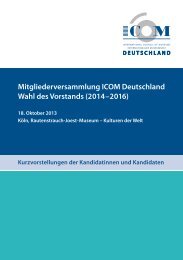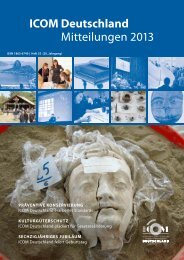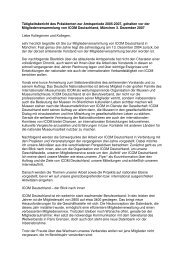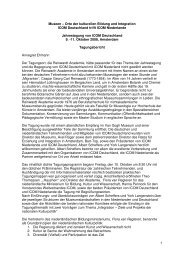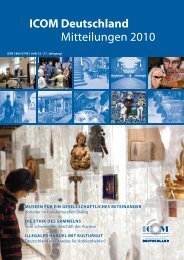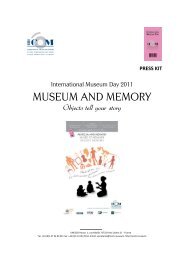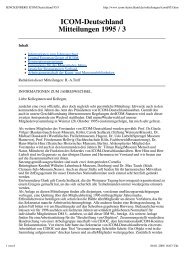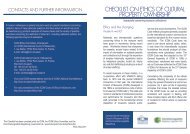ICOM Code of Ethics for Museums - The International Council of ...
ICOM Code of Ethics for Museums - The International Council of ...
ICOM Code of Ethics for Museums - The International Council of ...
You also want an ePaper? Increase the reach of your titles
YUMPU automatically turns print PDFs into web optimized ePapers that Google loves.
6.7 Use <strong>of</strong> Collections from<br />
Contemporary Communities<br />
Museum usage <strong>of</strong> collections from contemporary<br />
communities requires respect <strong>for</strong><br />
human dignity and the traditions and<br />
cultures that use such material. Such collections<br />
should be used to promote human<br />
well-being, social development, tolerance,<br />
and respect by advocating multisocial,<br />
multicultural and multilingual expression.<br />
(See 4.3).<br />
6.8 Supporting Organisations in<br />
the Community<br />
<strong>Museums</strong> should create a favourable<br />
environment <strong>for</strong> community support (e.g.,<br />
Friends <strong>of</strong> <strong>Museums</strong> and other supporting<br />
organisations), recognise their contribution<br />
and promote a harmonious relationship<br />
between the community and museum personnel.<br />
7. MUSEUMS OpERATE IN A lEGAl MANNER.<br />
principle<br />
<strong>Museums</strong> must con<strong>for</strong>m fully to international, regional, national and local legislation<br />
and treaty obligations. In addition, the governing body should comply with any legally<br />
binding trusts or conditions relating to any aspect <strong>of</strong> the museum, its collections and<br />
operations.<br />
lEGAl FRAMEWORK<br />
7.1 National and local legislation<br />
<strong>Museums</strong> should con<strong>for</strong>m to all national<br />
and local laws and respect the legislation<br />
<strong>of</strong> other states as they affect their operation.<br />
7.2 <strong>International</strong> legislation<br />
Museum policy should acknowledge the<br />
following international legislation that is<br />
taken as a standard in interpreting the<br />
<strong>ICOM</strong> <strong>Code</strong> <strong>of</strong> <strong>Ethics</strong> <strong>for</strong> <strong>Museums</strong>:<br />
• Convention <strong>for</strong> the Protection <strong>of</strong> Cultural<br />
Property in the Event <strong>of</strong> Armed Conflict<br />
(“<strong>The</strong> Hague Convention” First protocol,<br />
1954, and Second protocol, 1999);<br />
• Convention on the Means <strong>of</strong> Prohibiting<br />
and Preventing the Illicit Import, Export<br />
and Transfer <strong>of</strong> Ownership <strong>of</strong> Cultural<br />
Property (UNESCO, 1970);<br />
• Convention on <strong>International</strong> Trade in<br />
Endangered Species <strong>of</strong> Wild Fauna and<br />
Flora (Washington, 1973);<br />
• Convention on Biological Diversity (UN,<br />
1992);<br />
• Convention on Stolen and Illicitly Exported<br />
Cultural Objects (UNIDROIT, 1995);<br />
• Convention on the Protection <strong>of</strong> the Underwater<br />
Cultural Heritage (UNESCO,<br />
2001);<br />
• Convention <strong>for</strong> the Safeguarding <strong>of</strong> the<br />
Intangible Cultural Heritage (UNESCO,<br />
2003).<br />
11




